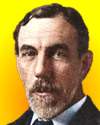 (source)
(source)
|
Sir William Ramsay
(2 Oct 1852 - 23 Jul 1916)
Scottish chemist who was awarded the 1904 Nobel Prize in Chemistry for his “discovery of the inert gaseous elements in air.”
|
Science Quotes by Sir William Ramsay (6 quotes)
Chemistry and physics are experimental sciences; and those who are engaged in attempting to enlarge the boundaries of science by experiment are generally unwilling to publish speculations; for they have learned, by long experience, that it is unsafe to anticipate events. It is true, they must make certain theories and hypotheses. They must form some kind of mental picture of the relations between the phenomena which they are trying to investigate, else their experiments would be made at random, and without connection.
— Sir William Ramsay
From 'Radium and Its Products', Harper’s Magazine (Dec 1904), 52.
It cannot, of course, be stated with absolute certainty that no elements can combine with argon; but it appears at least improbable that any compounds will be formed.
— Sir William Ramsay
As surmised in Gases of the Atmosphere (1896, 1905), 193. [The first argon compound was finally made a century later (Aug 2000), argon fluorohydride, HArF, but unstable above 40 K (–233 °C). —Webmaster]
One of the earliest questions asked by an intelligent child is: “What is this made of?” “What is that made of?” And the answer is generally more or less satisfactory. For example, if the question relates to butter, the reply may be, “From cream.” It may be explained, besides, that when cream is beaten up, or churned, the butter separates, leaving skim-milk behind. But the question has not been answered. The child may ask, “Was the butter in the milk before it was churned? or has it been made out of the milk by the churning?” Possibly the person to whom the question is addressed may know that the milk contained the butter in the state of fine globules, and that the process of churning breaks up the globules, and causes them to stick together. The original question has not really been answered; and indeed it is not an easy one to reply to. Precisely such questions suggested themselves to the people of old, and they led to many speculations.
— Sir William Ramsay
Opening paragraph of Modern Chemistry (1900, rev. 1907), 1.

Progress is made by trial and failure; the failures are generally a hundred times more numerous than the successes; yet they are usually left unchronicled. The reason is that the investigator feels that even though he has failed in achieving an expected result, some other more fortunate experimenter may succeed, and it is unwise to discourage his attempts.
— Sir William Ramsay
From 'Radium and its Products', Harper’s Magazine (Dec 1904), 110, No. 655, 52.
There is a difference between discovery and invention. A discovery brings to light what existed before, but what was not known; an invention is the contrivance of something that did not exist before.
— Sir William Ramsay
First line of 'How Discoveries Are Made', Cassell’s Magazine, Illustrated (May 1908), 629.
We have all heard of the puzzle given to Archimedes…. His finding that the crown was of gold was a discovery; but he invented the method of determining the density of solids. Indeed, discoverers must generally be inventors; though inventors are not necessarily discoverers.
— Sir William Ramsay
From 'How Discoveries Are Made', Cassell's Magazine, Illustrated (May 1908), 629.
Quotes by others about Sir William Ramsay (1)
Sir W. Ramsay has striven to show that radium is in process of transformation, that it contains a store of energy enormous but not inexhaustible. The transformation of radium then would produce a
million times more heat than all known transformations; radium would wear itself out in 1,250 years; this is quite short, and you see that we are at least certain to have this point settled some hundreds of years from now. While waiting, our doubts remain.
In La Valeur de la Science (1904), 199, as translated by George Bruce Halsted, in The Value of Science (1907), 105.
See also:
- 2 Oct - short biography, births, deaths and events on date of Ramsay's birth.
- The Early Days of Chemistry - by William Ramsay, Collected in Essays Biographical and Chemical (1909).
- Radium and its Products - by William Ramsay in Harper’s Magazine (Dec 1904).
- How Discoveries Are Made - by William Ramsay in Cassell’s Magazine (1908)
- Air: Scientific Discoveries and Inventions - from Haydn's Dictionary of Dates (1904).
- A Life of Sir William Ramsay, by Morris W. Travers. - book suggestion.
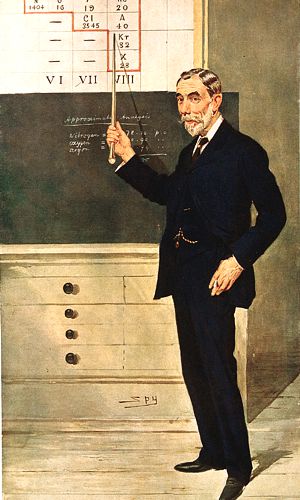
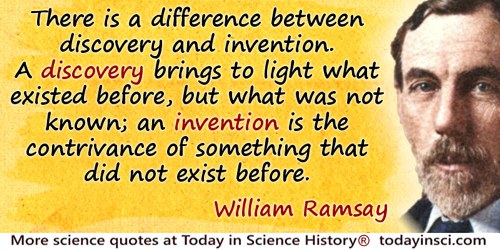
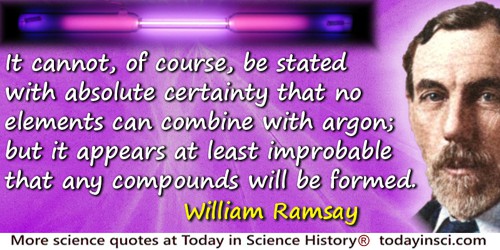

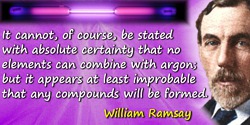
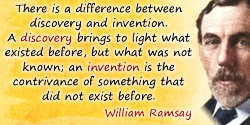
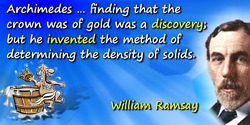
 In science it often happens that scientists say, 'You know that's a really good argument; my position is mistaken,' and then they would actually change their minds and you never hear that old view from them again. They really do it. It doesn't happen as often as it should, because scientists are human and change is sometimes painful. But it happens every day. I cannot recall the last time something like that happened in politics or religion.
(1987) --
In science it often happens that scientists say, 'You know that's a really good argument; my position is mistaken,' and then they would actually change their minds and you never hear that old view from them again. They really do it. It doesn't happen as often as it should, because scientists are human and change is sometimes painful. But it happens every day. I cannot recall the last time something like that happened in politics or religion.
(1987) -- 


